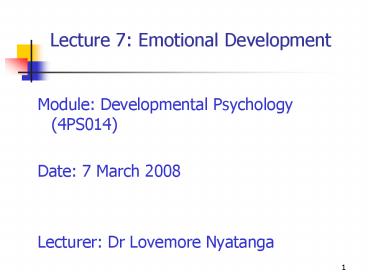Lecture 7: Emotional Development - PowerPoint PPT Presentation
1 / 20
Title:
Lecture 7: Emotional Development
Description:
Outline at two models of emotional development ... Irritation, Exasperation, & rage. Anger. Amazement & astonishment. Surprise ... – PowerPoint PPT presentation
Number of Views:97
Avg rating:3.0/5.0
Title: Lecture 7: Emotional Development
1
Lecture 7 Emotional Development
- Module Developmental Psychology (4PS014)
- Date 7 March 2008
- Lecturer Dr Lovemore Nyatanga
2
Learning outcomes
- At the end of the session students will be able
to - Define Emotion emotional development
- Outline at two models of emotional development
- Evaluate factors that influence emotional
development
3
What is emotion?
- A state of physiological response to subjective
feelings cognitions that necessitate action
(Siegler et al 2007)
4
Nature of Emotions
- Emotions are complex feelings that stem from
physiological psychological arousal in response
to perceived or imagined stimuli (after Bukatko
Daehler 2001). - Emotions tell us something about temperament,
adjustment sociability
5
Primary Secondary Emotions
- Primary Emotions are instinctive (adaptive
responses) to a given situation. Fight or flight
(autonomic) responses that may be evolutionary in
origin. - Secondary Emotions are secondary reactions to
primary emotions can be learned through
socialisation.
6
Primary Secondary Emotions
7
Positive Negative Emotions
- Positive
- Negative
8
Self-Conscious Emotions
- At the age of about 2 years children become aware
of emotions such as guilt, shame, pride
embarrassment and the links these emotions have
to other peoples reactions (Siegler et al 2007) - Self-Conscious Emotions can influence self-esteem.
9
Emotional Intelligence
- The ability to monitor ones own, and others
feelings and emotions, to discriminate amongst
them and to use this information to guide ones
thinking and action (Santrock 2002 p307) - Emotional intelligence can predict the success of
social interactions interpersonal relationships
10
Emotional Intelligence (Mayor-Salovey Model 1993)
11
Emotional Intelligence (Goleman Model 1995)
12
Emotional Regulation
- The process initiating, inhibiting, modulating
internal feeling states and related physiological
processes, cognitions behaviours (Siegler et al
2007 p387).
13
Development of Emotional Regulation
14
Development of Emotional Regulation
- Parental expression of emotions (goodness of fit)
- Primary secondary socialisation of emotions
- Gender differences
- Cultural differences
- Individual critical period
15
Measuring Emotional Intelligence
- There appear to be two broad views
- Emotional Intelligence as acquired ability (e.g.
Mayer Salovey 2000), - Emotional Intelligence as both ability traits
(e.g. Bar-On 1997, Goleman 1995)
16
Individual differences in emotional
development(Chess Thomas 1991)
17
Chronology of Emotions (Bukatko Daehler 2001)
18
Gender differences
- Females are more expressive more sensitive to
other people, emotions than men (Bukatko
Daehler 2001). - Girls tend to show more positive emotions than
boys. - Socially girls are encouraged to smile more than
boys. - Females tend to internalise emotions while males
externalise.
19
Summary of emotional development
- Emotions are instinctive evolutionary because
they can be linked to the flight or fight
responses. - The secondary process of emotional development
involves shifting from care-giver regulation to
own ability to select appropriate emotional
reactions - Self-Conscious Emotions are associated with self
esteem - Parental expression of emotions can affect the
childs emotional regulation - Emotional Intelligence is thought to predict
academic social achievements - There are gender cultural differences in
emotional regulation
20
Recommended reading
- Bukatko, D. Daehler, M (2001) Child
Development a thematic approach. Houghton
Mifflin Boston - Santrock, J. (2002) Lifespan Development
(International Edition). McGraw Hill London - Siegler, R., Deloache, J. Eisenberg, N. (2006)
How children develop 2nd edition. Worth
Publishers London, chapter 10 (module textbook)































